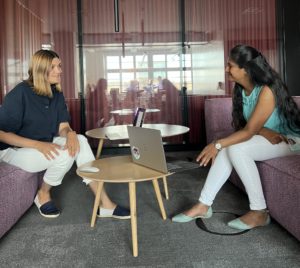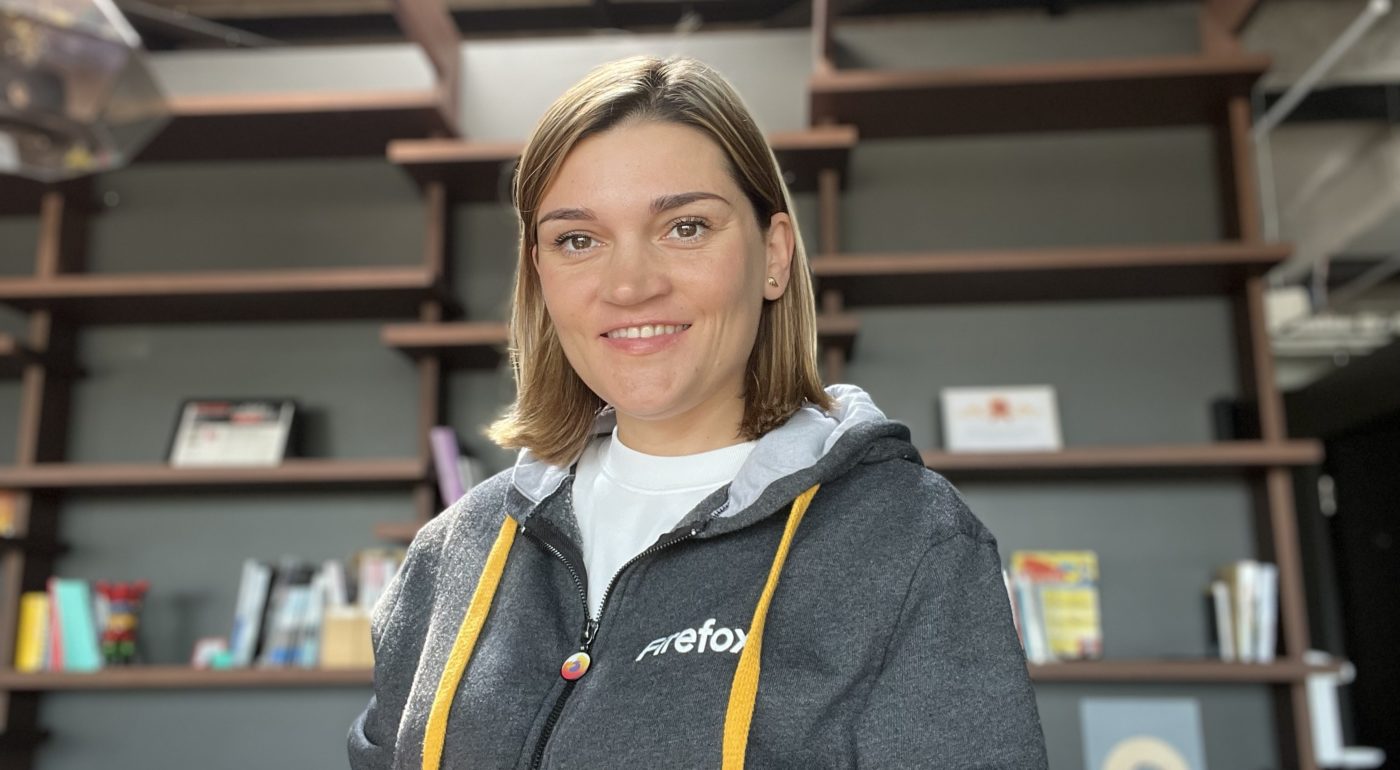From San Francisco to Bangalore to her office in Berlin, Xenia Tovchykh spends her days working with teammates all over the world, and keeping all things accounting running smoothly for her fellow Mozillians. Below, Xenia explains what drew her to Mozilla from another job she loved, what she says to team members with questions about growing their careers, and how the company supports life outside of work — even across time zones.
What do you do at Mozilla?
My job is Head of Global Accounting Operations. I manage a team of five spread across Berlin and San Francisco, and I co-lead two teams of vendors in Bangalore that help us with accounts payable and general ledger. Every day is different, because you never know what you’ll need to solve — an employee might have questions about how to submit expenses; we might have to sort out a hiccup in our accounting systems; we might need to look into an unexpected charge. A lot of other functions rely on us, because everyone needs to know about their budget and revenue, so it’s important that we keep things running smoothly.
We’re also busy in the first few months of the year with annual audits, and we often advise the Product team when they’re preparing for a launch. We’re working on streamlining some of our processes, too. Then there’s managing the team itself, which is my favorite part of the job. I love seeing people grow and develop over the years and expand their impact. I try to help them learn soft skills along with the technical accounting stuff, and I like being there to support them as they think about how to navigate their careers. Maybe someone wants to be a manager but they’re worried they won’t be good at it. I get to say, “Managers make mistakes, too. It’s okay as long as you learn.” Just being there to encourage people — there’s nothing more rewarding in the world.
Tell us about your background, before you joined Mozilla and since.
It’s interesting — I wanted to work in finance even when I was a teenager. I was part of an international youth-run NGO called AIESEC, and I would go to lectures by people at big companies and dream of wearing a suit and working in a big glass building. I studied economics in Ukraine, where I’m from, and moved to Spain when I was 21. I got another master’s in auditing there and worked in various firms, then came to Berlin in 2016 for my first leadership role. After that I joined a travel unicorn called GetYourGuide, where I was really happy. I might never have left! But the opportunity at Mozilla came up and I loved the company and the people I interviewed with, and I was especially excited about the mission to build an internet that’s accessible to everyone. That opens up so much — if you have internet, you can read books, learn new languages. I know what it’s like to grow up without resources and feel disconnected from the world, so I was very motivated to join.

I started at Mozilla about a year and a half ago as a Global Accounting Manager, and had the chance to work on several projects. At the time, we were transferring knowledge from the accounting department in the U.S. to our teams in Europe and India, which was a big challenge. We also changed the way we build the book of revenue, to make it more transparent across the organization. And we streamlined the month-end close process, where we tie up all the financials and say, “Okay, this is the result.” I got to create a calendar that made it very clear who’s doing what and when. Then just recently, I had the opportunity to move up into my current role.
One of Mozilla’s operating values is welcoming differences. How has that played out in your experience?
We do work across time zones, but we’re well-positioned here in Europe to work with both India and the U.S. We try to schedule meetings that really work for everyone, so we’re not staying too late and our colleagues in San Francisco aren’t getting up too early. It’s just a matter of finding the middle ground and being respectful and understanding of each other’s situations.
Communicating cross-culturally is a learning experience. We realized recently that every single person on my team has a different passport — and that’s wonderful. It gives us the perspective to see how something like payment methods might need to change for our users in one country versus another, and helps us be a truly global organization. But it also means we need to be mindful of how we talk and email with each other. We tend to be very direct in Europe, for example, which isn’t what our colleagues in the U.S. and India are used to. My manager, Matt Becker, is from the U.S., and I remember he used to help me rephrase my emails and I would think, “But I said it right!” Now I understand how helpful that was, and I coach my team the same way. Erin Meyer’s book The Culture Map has been extremely useful, too — I think our whole department has read it. [Ed note: Erin Meyer spoke at the February 2020 Mozilla All Hands event, our last time gathering as a company since the pandemic.]
We just started going to the office recently, and I’ve never met a lot of our overseas colleagues in person, but I actually feel very connected to the team. And our European leadership team (the ELT) is doing great work to bring more attention to Europe. That’s something we’re still working on, across Mozilla, as the team here grows. A quarter of our total workforce is in this region now; we’re a big part of the company.
Part of the Mozilla mission is to put people first — including the team. How does the company support you outside of work?
 It’s a very human, very understanding environment. I’m a mother of two, and I’ve certainly never been discriminated against because of that, or felt like people worried I couldn’t be both a manager and a mom. It’s just not a concern. There’s a lot of flexibility, as well — this afternoon I have one meeting, then I’m going to pick up my child from kindergarten, then I’m coming back for more calls. And if something’s happening like a school event or tournament, work rarely gets in the way. Vacations are actually vacations, too. I’m about to go out on two weeks of PTO, and I do not intend to take my laptop. I try to set a good example for my team by using my time off and encouraging them to do the same. We have to take opportunities to recharge our batteries, mentally and physically.
It’s a very human, very understanding environment. I’m a mother of two, and I’ve certainly never been discriminated against because of that, or felt like people worried I couldn’t be both a manager and a mom. It’s just not a concern. There’s a lot of flexibility, as well — this afternoon I have one meeting, then I’m going to pick up my child from kindergarten, then I’m coming back for more calls. And if something’s happening like a school event or tournament, work rarely gets in the way. Vacations are actually vacations, too. I’m about to go out on two weeks of PTO, and I do not intend to take my laptop. I try to set a good example for my team by using my time off and encouraging them to do the same. We have to take opportunities to recharge our batteries, mentally and physically.
The culture makes a difference in more difficult situations, too. My mom is with me in Berlin right now; she’s a refugee of the war in Ukraine. I have classmates and friends displaced all over Europe. It’s painful seeing what people are going through. But there’s a lot of support here — and it’s the right amount of support. My colleagues aren’t invasive, but I know they care. They ask how I’m doing. I was also invited to talk during European All Hands about what people can do to help, and we were able to collect donations to help a local volunteer group that’s helping provide food and other necessities, which was very rewarding. I can’t end the war, but I can help the people affected.
What does the future hold for you and your team at Mozilla?
In terms of the team, there’s so much we can do. We’re looking forward to implementing new accounting software later this year, along with some other improvements on the operational side. For me, I hope to make a bigger impact here as the years go by, and to one day become a director. I’m a believer in owning your development — if you know what you want and you’re asking for opportunities to follow that path and grow, your manager will see that. So I do a lot of research, and I learn by observing — seeing what my manager and other leaders do. I’m also working with a mentor, Katherine Bose, who’s Mozilla’s VP of business and corporate development, and I’ve been really grateful for her insights. We meet once a month, and she helps me understand the things she’s thinking about — like how departments can work better together and how to make the most efficient use of our resources.
There’s a lot to learn and a lot of skills to develop, but I hope one day I’ll be equipped to work at that level. I know I’ll have failures and make mistakes, like anyone else. But like I tell my team members, you don’t have to be perfect to grow your career. You just need to be determined and ready to learn.
Interested in starting your career at Mozilla?
|
